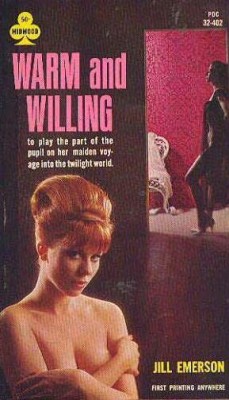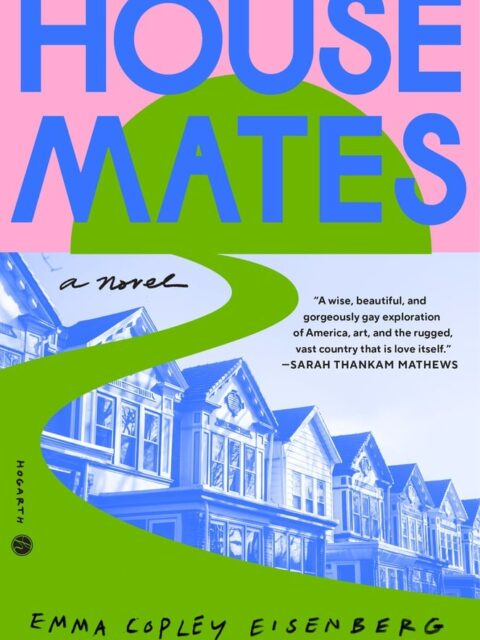Valerie Taylor’s Stranger on Lesbos is an example of classic pulp lesbian fiction. It was published in 1960, at the midpoint of the genre, and it seems like a really tropey example of it!
Frances Ollenfield escaped a childhood of abuse and poverty into a marriage that is slowly becoming more and more loveless as the family’s fortunes improve. When her husband suggests that she go back to university to finish her degree, Frances leaps at the chance – which happens to bring her Mary Baker, Bake to her friends, who soon becomes her lover.
When I say that Stranger on Lesbos a tropey example, I’m not exaggerating; my understanding of lesbian pulps is that the repeating tropes include bar crawling, jail time, and often a dark-haired worldly woman somehow “leading an innocent astray”, and an ending where the lesbian characters must be separate – all of which is present here, in a fast-paced and melodramatic story, as I’d hope a pulp story would be. The story focuses on the conflict between Frances’ love of her husband and son (and her boredom and disappointment with the life they’ve built as her family’s interests move away from her) and her love for Bake (with its excitement and danger, which brings her new friends and experiences, even if they sour for her as well).
The narrative is at times quite distant, which I think is a stylistic choice as it matches fairly well with Frances’ feeling of disconnection from her life and the people around her. However, there are strange time skips, in one case of two years between chapters, which don’t seem to have changed much in the character’s lives except that Frances abandons her degree again in favour of a job and the conflicts in her relationship with Bake to start to bubble through. There are also scenes that revisit Frances’ past in a mining town with her abusive father, and the emotions in those scenes are harrowing and explain a lot about where Frances came from. (I was not kidding about the melodrama!)
I have to admit though that I genuinely rooted for Frances to leave all of her relationships in the dust and walk away from about halfway through. While it’s easy to see why she fell in love with Bake (she is charming and intelligent, and presents herself as very confident and controlled), and Bill, Frances’ husband, clearly had moments where he was sweet and affectionate… None of Frances’ friends seem to make her happy, and by about half-way through both of Frances’ romantic partners treat her terribly. Bake is charming and intelligent… But also a drinker, a cheater, and lets Frances down in the worst ways when she needs her. Bill alternates between distant and actively abusive (more on that later.). Frances wants to stay with her husband for the sake of her son… But her son seems to feel contempt for the women she keeps company with, and by extension her. There is a point in the book where he asks her to give up her queer friends, with every expectation that she’d comply, and while that’s depicted as selfish and awful on his part,
(Caution warning for this paragraph: rape) As a fair warning, there are minimum two rapes and a third attempted one in this book; strangely though, the marital rape is never referred to as such, whereas the lesbian one is clearly stated to be rape. I don’t know if it’s just the time that the book was written (marital rape didn’t become a crime in the states until the 1970s), or if it’s because the circumstances around the lesbian rape (it was by a stranger, with violence, and she was drunk), but it seems really odd that they’re treated so differently. Especially because one is treated as actively reprehensible, and the other as something that could be worked past. That sound you heard was me angrily shrieking at the book.
Without any spoilers; the ending is infuriating, to the point where I had to put it down and walk away for a while. But the afterword assures me that Stranger in Lesbos is the first book in a series, and that my problems with Frances’ romantic choices might be mitigated by the third book. And while parts of this book made me angry, the writing was good enough and I was emotionally invested enough that I am considering seeing if I could track down the rest of the series. So, if you’re interested in lesbian pulp fiction, this is a solid example of it, but there are parts of it that I have significant reservations about.
Trigger warnings: homophobia, adultery, abuse, incest, rape.
Susan is a library assistant who uses her insider access to keep her shelves and to-read list permanently overflowing. She can usually be found writing for Hugo-nominated media blog Lady Business or bringing the tweets and shouting on twitter.



Widdershins says
I know lesbian pulp is part of our herstory, but my blood boils at the mere thought of reading one. Many ‘bravo’s’ to you for getting through this one. 🙂 … let us know how the search goes. I’d be interested to know how book 3 turns out. 🙂